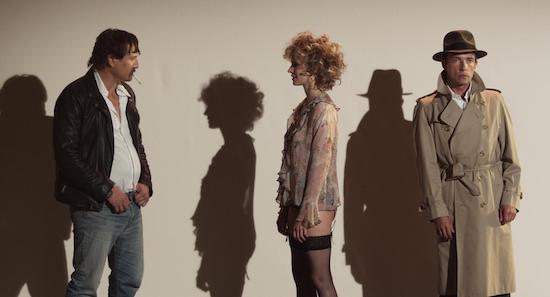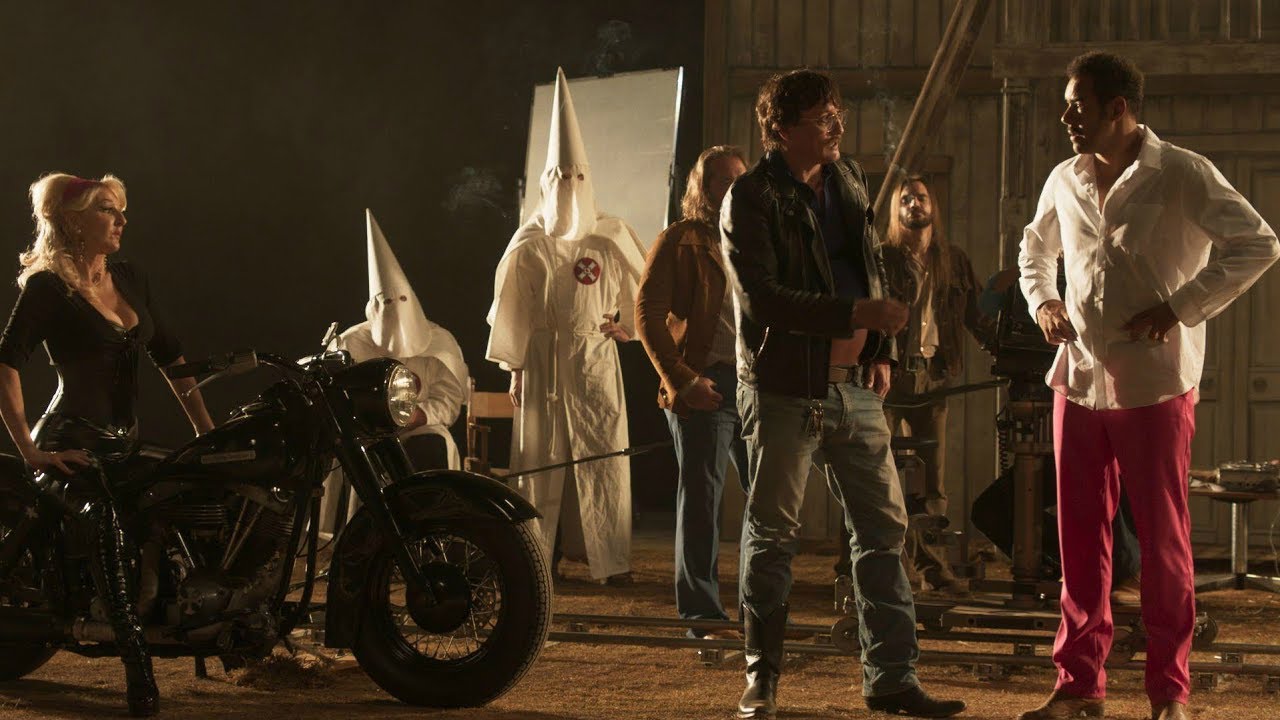The facts of his life are wilder than any screenplay.
Rainer Werner Fassbinder began his career in the early 1960s as the bad boy of the Bavarian theatre scene. By his mid-twenties, he was making films and soon became, alongside Wim Wenders and Werner Herzog, a central figure of the German New Wave. Fuelled by a combination of obsession, hard drugs and Cuba Libres, Fassbinder churned out more than 40 films over 13 years, making use of a revolving ensemble of cast and crew members (a wildly dysfunctional surrogate family of friends, colleagues, lovers and ex-lovers). His open bisexuality, drug use and love of provocation made him a counter-culture icon. By 1982 he was dead, killed by an overdose at 37 years old.
The arc of Fassbinder’s life provides ample if unruly material for Enfant Terrible, Oskar Roehler’s anarchic biopic which screens in BFI Flare this month. Following the filmmaker from his theatre days until his premature death, the film’s tone is appropriately frenzied, paying campy tribute to its subject’s larger-than-life persona. Oliver Masucci (best known to international audiences for playing Hitler) captures Fassbinder’s tyrannical energy, high as a kite in an increasingly dishevelled leopard print suit, brandishing rum and cokes like dangerous weapons.
Fassbinder was famously cruel to those around him, and Roehler depicts many a violent tantrum and sadistic set piece. Ultimately, however, the director shares his subject’s relish for drama, and the film’s slapstick quality and simplistic explanations (“Each man kills the one he loves,” reads a title card) cannot help but trivialise the abusive behaviour we see. In the end the filmmaker is rendered as pastiche, and the viewer gains little insight into how this perplexing figure kept his inner circle in his thrall for so long.
Enfant Terrible is only the latest in a string of films charting the extremes of Fassbinder’s character. Over the four decades since his death, dozens of documentaries have profiled the filmmaker, including several focused specifically on the supporting players in his life – his women, his actors, his lovers. The first-person testimonies in these films reveal the extent of the director’s cruelties. Irm Hermann, a former girlfriend and star of 20 Fassbinder films, describes a decade of emotional and physical abuse that drove her to attempt suicide. Cinematographer Michael Ballhaus talks about being driven to the edge by Fassbinder’s goading. Multiple witnesses attest to Fassbinder’s brutal treatment of his lover Armin Meier, who committed suicide in the aftermath of their breakup.
This side of the filmmaker was never secret, but seems to have been dismissed in his lifetime as simply another excess, the side-effects of genius. Looking again today however, in a post-#MeToo climate, it has become increasingly difficult to be a Fassbinder fan without acknowledging the undeniable behind-the-scenes suffering that went into the work we love.
That central dilemma – monstrous artist, brilliant art – is nothing new. Stories about Fassbinder slapping Hanna Schygulla slot neatly next to Quentin Tarantino coercing Uma Thurman into a dangerous car, David O’Russell calling Lily Tomlin a cunt, and Hitchcock driving Tippi Hedren to the brink of a nervous breakdown. What makes this case different, however, is Fassbinder’s huge significance for LGBTQI+ and female film fans.
The inclusion of Enfant Terrible in BFI Flare demonstrates Fassbinder’s continued currency in queer circles. Many of our best-loved chroniclers of LGBTQI+ lives – Francois Ozon, Pedro Almodóvar and Todd Haynes – are heavily indebted to the director. Indeed, the hallmarks we associate with those filmmakers – great female roles, ensemble casts, camp aesthetics, melodrama – can be traced directly back to Fassbinder. The director’s centring of queer characters was revelatory, offering a still largely Christian and conservative Germany films built around love-sick lesbians, cruising gay men and even a trans female heroine (Elvira in 1978’s In a Year of 13 Moons, released two years before trans rights gained legal recognition in the country). His women, from the heartbroken Petra von Kant to the ambitious Maria Braun, are also unusually rich and complicated, and remain some of the most memorable female characters in 20th century film. Fassbinder’s work is so strongly associated with queering gender that Radu Gabrea’s choice of a woman, actress Eva Mattes in drag, to play the director in his 1984 biopic A Man Like Eva, makes total sense.

As queer and/or female film fans, we are used to seeing ourselves as victims on screen and have become hyper-aware of the cycles of exploitation that produce the work we watch. It feels problematic, then, to leave unexamined the fact that these foundational films were made by a man who inflicted well documented suffering. What does it mean, as a woman and/or queer person, to find liberation and release in Fassbinder’s films, while acknowledging the pain that went into making them? How can we be Fassbinder fans without erasing his victims?
For Fassbinder, the line between life and art often blurred to the point of meaninglessness. This blurring is partly what makes him so powerful as a queer symbol, but it also renders attempts to separate the art from the artist impossible.
As a bisexual man making films centred on LGBTQI+ characters, Fassbinder constantly plundered his own life for material; almost every film is a work of memoir. The lesbian love triangle in The Bitter Tears of Petra von Kant was based on one of Fassbinder’s thwarted love affairs. Vulnerable Fox, who is manipulated by a group of snobbish gay men in Fox and His Friends, is played by Fassbinder himself, but is based on his lover Armin Meier. The suffering of Elvira, the trans woman at the heart of In a Year of 13 Moons, represents the filmmaker’s despair in the aftermath of Meier’s suicide.
Even apparently heterosexual narratives connect directly to Fassbinder’s experience. Fear Eats the Soul centres on the relationship between Emmi (Brigitta Mira), a middle-aged German cleaning woman and Ali (El Hedi ben Salem), a much younger Moroccan immigrant. This age- and race-transgressing relationship attracts widespread hostility, and clearly reads as a stand-in for all taboo relationships in a prejudiced society. Knowing that Salem was Fassbinder’s lover, and that the film was written as a tribute to him, draws out these connections even further.
Just as he wrote roles for his lovers, Fassbinder frequently created characters specifically for the women he most admired. Fear Eats the Soul’s Emmi is exactly the kind of heroine that makes Fassbinder’s films so appealing to female fans. Fear is Fassbinder’s take on a classic Hollywood melodrama, but features a defiantly unglamorous, middle-aged and working class female lead who would never have made it past a 1950s studio head. In Mira’s hands, Emmi is a sweet and naive everywoman, driven to an out-of-character act of bravery by the surprise arrival of new love.
Fassbinder’s fascination with women’s inner lives reached its peak with the BRD Trilogy, three films made in quick succession – The Marriage of Maria Braun in 1978, Lola in 1981 and Veronika Voss in 1982 – which offered an exploration of post-war German society from the perspective of three richly drawn heroines. For the actresses who took the title roles in the trilogy – Hanna Schygulla, Barbara Sukowa and Rosel Zech respectively– these high-profile parts offered potentially career-making breaks. All three films performed well commercially internationally, and Maria Braun was a particular smash, becoming the highest-grossing German film ever in the US and securing Schygulla the Best Actress award at the Berlin Film Festival. The price of this opportunity, however, was total sublimation. Schygulla later described working with Fassbinder as like living in a fascist regime, while Margit Carstensen’s (Petra in Bitter Tears) experience was full of daily indignities: “He provoked and tormented me daily with snide remarks… what he demanded was love, or let us say, voluntary submission.”

Perhaps one way to consume Fassbinder without condoning the man is to resist this voluntary submission. It is possible to watch Fassbinder submissively, to lean into his bleaker moments and read his most cynical readings of human nature at face value. But it’s possible, too, to resist the vision of Fassbinder as chilly, uncompromising and cruel, and to find real tenderness in his work. Fear Eats the Soul, Fassbinder’s warmest film, has a streak of affectionate humour that counterbalances harsher plot points. A scene in which Emmi takes Ali to a fancy restaurant (“Hitler used to eat here, I’ve been dying to try it”) and is blindsided by snooty waiters is the perfect example of this winning goofiness, both hilarious and heartbreaking.
We can also relish Fassbinder’s moments of tactile beauty and glorious kitsch. We can embrace the camp of his melodramas – moody lighting, lush colours, incomparable wallpaper – and dream of living, like Petra von Kant, in a gilded baroque apartment surrounded by cherubs. We can relish the fantastically over-the-top dance routine in 13 Moons, delight in the ridiculous overblown death scene in The American Soldier and glory in the sight of Fox strutting proudly in a denim jacket with his name on the back. Perhaps by seeking out the pleasure in his work, we find a way to neutralise Fassbinder’s darker side; we turn pain into something beautiful.
Ultimately, the problem of Fassbinder is a problem as old as cinema itself. To point a camera is to seize power. To make a film is to exploit an image. Is there any way to be a film fan without engaging in cinema’s abusive power dynamics? The tangled mess between art and life means that Fassbinder the man can never be fully separated from his films, or from his trail of victimised stars. It’s possible, however, to watch in full acknowledgement of that mess, and to find within them something warm, real and human.
In many Fassbinder films, that warmth comes from the actors, the very people who were most vulnerable to their director’s abuses. Salem’s Ali is wonderful, raw and charming, never less than dignified in the face of degradation. Schygulla’s Maria Braun is indelible, indomitable, ruthlessly pragmatic, a heroine for the ages. Mira’s Emmi is vivid, lovable and real, once watched, never forgotten. Fassbinder’s dream machine spat out its actors, but it also immortalised their brilliance. Now, 40 years after Fassbinder’s death, we are left with these images that inspire. A dead director, a difficult legacy, a dazzling after-burn.
Enfant Terrible is screening as part of BFI Flare: London LGBTIQ+ Film Festival until 28 March and subsequently available on BFI Player along with a collection of films by Rainer Werner Fassbinder



